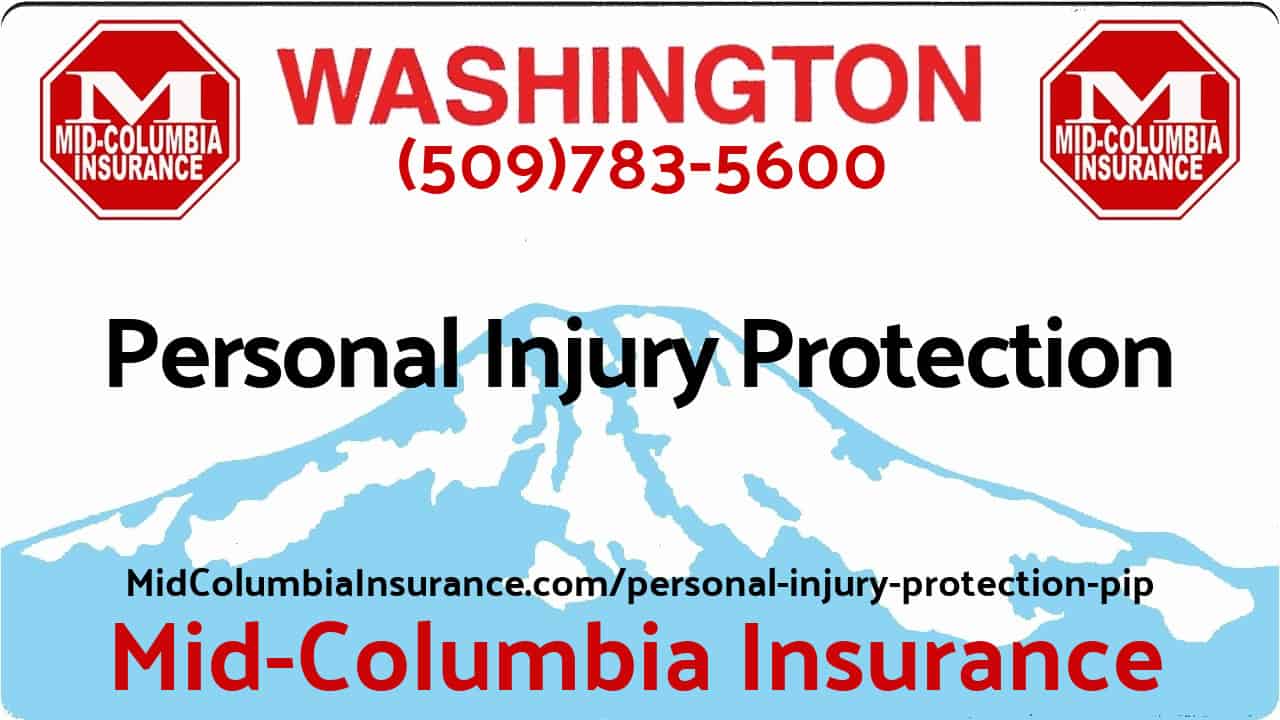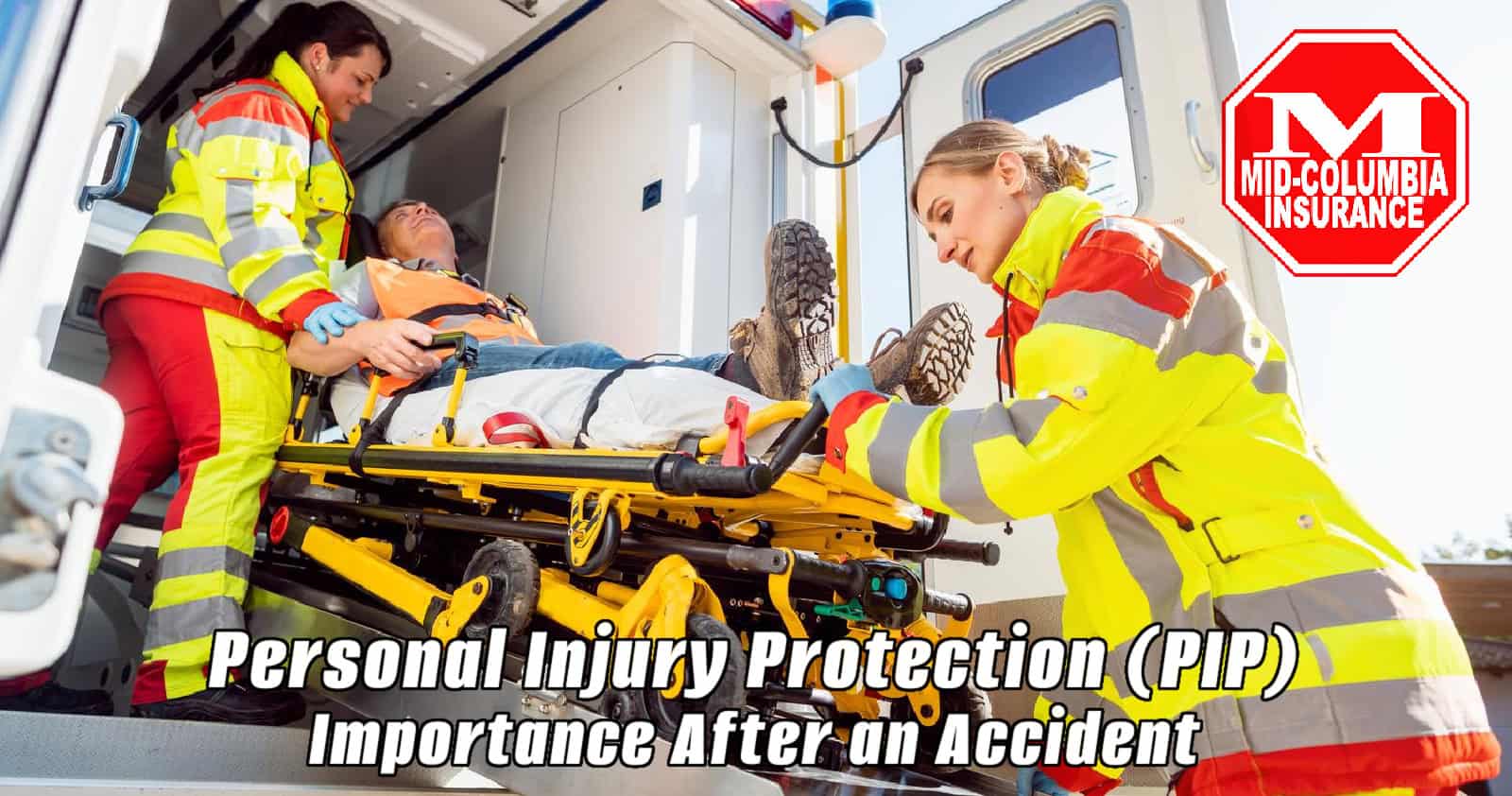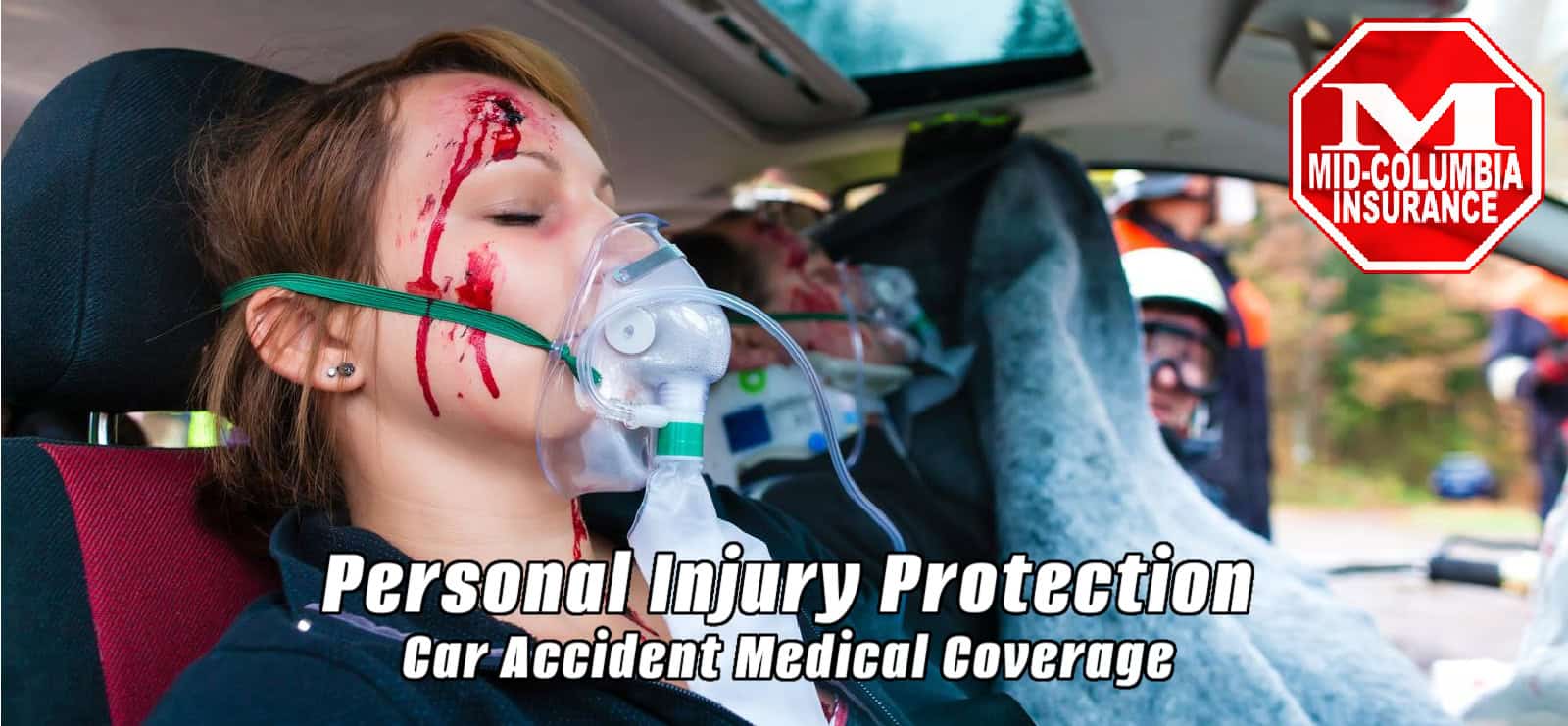Importance of Personal Injury Protection (PIP) After an Accident
Personal Injury Protection (PIP) is a crucial type of car insurance coverage that every responsible driver in Washington state should seriously consider. While liability insurance is mandatory, PIP is an optional coverage that deserves special attention due to its numerous benefits. In this article, we’ll look into the details of personal injury protection coverage, explain why PIP is so important, and highlight why it’s a wise choice for drivers in the Evergreen State.
What is Personal Injury Protection (PIP) Insurance?
Personal Injury Protection (PIP) provides coverage for medical expenses, lost wages, and other essential services for you, your family, and your passengers in the event of an accident regardless of who is at fault in the collision. In many states PIP is mandatory but in Washington state the insured can reject coverage.
Personal Injury Protection (PIP) insurance not only covers you and your family members when you’re in a vehicle, but it also extends coverage to situations where you or your household family members are pedestrians.
If you or a family member is struck by a vehicle while walking, jogging, riding a bike, or even standing on the sidewalk, your PIP coverage will help pay for medical expenses, lost wages, and other related costs, regardless of who was at fault in the accident. This additional layer of protection ensures that you and your loved ones are covered in a variety of scenarios, not just when you’re behind the wheel. It’s a valuable benefit that provides peace of mind knowing that you have financial support in case of an unexpected pedestrian accident.
Gary Paulson, owner of Mid-Columbia Insurance, emphasizes the importance of PIP: “In my years of experience, I’ve seen countless instances where PIP coverage has made a tremendous difference in our clients’ lives after an accident. It provides peace of mind and financial support when it’s needed most.”
Who is Covered Under PIP Insurance?
One of the standout features of PIP insurance is its broad coverage. When you have PIP as part of your auto policy, it extends protection to:
- Household members related by blood, marriage, or adoption in your car or someone elses or as pedestrians.
- Step-children and foster children who are household members in your car or someone elses or as pedestrians.
- Non-family member passengers in your car.
It’s important to note that for you or your relative to make a PIP claim, any household vehicle involved in the accident must be listed on your auto policy’s declaration page.
What Does PIP Insurance Cover in Washington State?
Personal Injury Protection offers extensive coverage for a range of accident-related expenses. This table illustrates the breakdown in coverage limits between the standard $10,000 PIP limit and the increased $35,000 PIP limit in Washington State:
| Coverage | $10,000 PIP Limit | $35,000 PIP Limit |
|---|---|---|
| Medical and Hospital | Up to $10,000 per person | Up to $35,000 per person |
| Funeral Expenses | Up to $2,000 per person | Up to $2,000 per person |
| Wage Loss | Up to $200 per week ($10,000 total) | Up to $700 per week ($35,000 total) |
| Loss of Services | Up to $200 per week ($5,000 total) | Up to $14,600 total |
What Our Customers Are Saying About Us
The Advantages of Having PIP Coverage
Now that we’ve covered the basics of PIP insurance, let’s explore the compelling reasons why it’s a valuable addition to your auto policy:
- No-Fault Coverage: One of the most significant advantages of PIP coverage is that it applies regardless of who caused the accident. This means you can receive benefits quickly without the need to prove fault or wait for a lengthy claims process.
- Immediate Medical Coverage: With PIP, you have the assurance that your medical expenses will be covered promptly after an accident. This allows you to focus on your recovery without worrying about the financial burden of hospital bills and treatment costs.
- Broad Protection: PIP extends coverage not only to you but also to your passengers and even pedestrians involved in the accident. This comprehensive protection ensures that everyone receives the necessary medical attention and financial support.
- Supplements Health Insurance: Even if you have health insurance, PIP can provide valuable additional coverage. It may help pay for deductibles, copayments, and services that your health plan doesn’t cover, such as dental work or chiropractic care.
- Peace of Mind: Accidents can happen to even the most careful drivers. Having PIP coverage offers peace of mind, knowing that you and your loved ones will have access to essential benefits if the unexpected occurs.
Is PIP Insurance Required in Washington State?
While PIP is not mandatory in Washington, state law requires insurance companies to offer it to all policyholders. If you choose not to purchase PIP, you must sign a written waiver rejecting the coverage. However, if you don’t sign the waiver, your insurer will automatically add PIP to your policy and charge you for it.
Gary Paulson advises, “It’s crucial for drivers to carefully consider their options before rejecting PIP coverage. The benefits it provides can make a world of difference in the aftermath of an accident.”
Exclusions and Limitations of PIP Coverage
Although PIP offers incredible protection, there are certain situations where it may not apply. PIP insurance typically does not cover:
- Injuries caused by using motorcycles, mopeds, recreational or off-road vehicles, or farm equipment (although some motorcycle policies may offer PIP as well)
- Intentional injuries caused by the insured person
- Injuries sustained by the insured person while participating in organized racing activities
- Injuries that occur while the insured person is committing a felony
- Services deemed unreasonable, unnecessary, or unrelated to the accident by the insurance company
- Expenses incurred more than three years after the accident
The Cost of PIP Insurance
The price of PIP coverage varies among insurance providers and depends on the same factors used to determine your other premiums such as your age, your driving record, and your address.
However, the cost of PIP is relatively low compared to the valuable benefits it provides. Many drivers find that the peace of mind and financial protection offered by PIP far outweigh the additional premium.
Making a PIP Claim
If you find yourself in the unfortunate situation of being involved in an accident, making a PIP claim is a straightforward process. Here are the steps to follow:
- Seek Medical Attention: Your health and well-being should be your top priority. Seek medical care as soon as possible after the accident, even if your injuries seem minor.
- Notify Your Insurance Company: Contact your insurance provider promptly to report the accident and initiate the claims process. Provide them with all the necessary details, including the date, time, location, and a description of what occurred.
- Gather Documentation: Keep detailed records of all medical treatments, hospital visits, and expenses related to the accident. This documentation will be essential when submitting your PIP claim.
- Submit Your Claim: Follow your insurance company’s procedures for filing a PIP claim. This typically involves completing a claim form and providing supporting documentation, such as medical bills and proof of lost wages.
- Cooperate with Your Insurer: Your insurance company may request additional information or require you to undergo an independent medical examination. Cooperate fully with their requests to ensure a smooth claims process.
It’s important to note that you have up to three years from the date of the accident to submit your PIP claim in Washington State. However, it’s always best to initiate the process as soon as possible to avoid any delays or complications.
The Relationship Between PIP and Personal Injury Lawsuits
In Washington, having PIP coverage does not prevent you from filing a personal injury lawsuit against the at-fault driver. PIP is designed to provide immediate financial relief for medical expenses and lost wages, regardless of fault. However, if your damages exceed the limits of your PIP coverage, you may still have the option to pursue additional compensation through a personal injury claim.
If you do choose to file a lawsuit, your PIP insurer may seek reimbursement from the at-fault driver’s insurance company through a process called “subrogation.” This means that your PIP benefits may be deducted from any settlement or award you receive from the other driver’s insurer.
It’s essential to consult with an experienced personal injury attorney to understand your legal rights and options after an accident. They can help you navigate the complexities of insurance claims and ensure that you receive the full compensation you deserve.
PIP vs. MedPay: Understanding the Difference
Some insurance companies offer another optional coverage called Medical Payments (MedPay). While MedPay shares similarities with PIP, there are some key differences to be aware of:
- MedPay only covers medical expenses, while PIP also provides benefits for lost wages, funeral costs, and loss of services.
- MedPay coverage limits are typically lower than those of PIP.
- In some states, MedPay may have a deductible, while PIP usually does not.
When deciding between PIP and MedPay, it’s important to consider your individual needs and budget. Consult with your insurance agent to determine which coverage best fits your situation.
Mid-Columbia Insurance
– Your Trusted Auto Insurance Agent
In the world of auto insurance, Personal Injury Protection (PIP) stands out as a valuable safeguard for drivers in Washington State. By providing comprehensive coverage for medical expenses, lost wages, and essential services, PIP offers a safety net that can make a significant difference in the aftermath of an accident.
At Mid-Columbia Insurance, we strongly encourage our clients to consider adding PIP coverage to their auto policies. The benefits it provides far outweigh the relatively low cost, and it can give you the peace of mind that comes with knowing you and your loved ones are protected.
Remember, accidents can happen to anyone, but with Personal Injury Protection, you can have the confidence that you’ll have the support you need to get back on your feet.
If you have any questions about PIP insurance or would like to explore your coverage options, our knowledgeable team at Mid-Columbia Insurance is here to help.
Contact us today to learn more about how we can help you find the right auto insurance solution for your needs.Request an auto quote from one of our independent insurance agent professionals today by calling (509)783-5600 or click “Get a Quote”.
The coverage you want — At a price you can afford.
Source:Washington State Insurance Commisioner
Frequently Asked Questions
| Question | Answer |
|---|---|
| Is PIP insurance mandatory in Washington State? | No, PIP coverage is optional in Washington, but insurers must offer it to policyholders. If you don’t want PIP, you must sign a written waiver rejecting the coverage. |
| Can I use my PIP benefits if I’m at fault for the accident? | Yes, Personal Injury Protection applies regardless of who is at fault in the accident. It provides immediate coverage for medical expenses, lost wages, and other essential services. |
| How does PIP work with my health insurance? | PIP insurance can supplement your health insurance by covering deductibles, copayments, and services that your health plan may not cover, such as dental work or chiropractic care. |
| What happens if my PIP coverage isn’t enough to cover all my expenses? | If your accident-related expenses exceed your PIP limits, you may need to rely on your health insurance or pursue a personal injury claim against the at-fault driver. |
| How long do I have to file a PIP claim in Washington? | In Washington State, you have up to three years from the date of the accident to submit your PIP claim. However, it’s best to initiate the process as soon as possible to avoid delays. |
| Can I still sue the at-fault driver if I have PIP insurance? | Yes, having PIP coverage does not prevent you from filing a personal injury lawsuit against the at-fault driver. PIP provides immediate benefits, but you may still pursue additional compensation if your damages exceed the PIP limits. |
| What is the difference between PIP and MedPay? | While both PIP and MedPay cover medical expenses after an accident, PIP offers broader coverage, including lost wages, funeral costs, and essential services. MedPay typically has lower coverage limits and may have a deductible. |
| How much does PIP insurance cost in Washington? | The cost of PIP coverage varies depending on your insurer and the number of vehicles on your policy. Generally, the more vehicles you insure, the higher your PIP premium will be. However, the added cost is relatively low compared to the benefits provided. |
| Do I need PIP coverage if I don’t own a car? | If you frequently ride in other people’s vehicles or use public transportation, you may still benefit from having PIP insurance. Some policies extend coverage to you as a passenger or pedestrian. |
| Can I add PIP coverage to my motorcycle insurance policy? | Some motorcycle insurance policies in Washington offer PIP coverage, but it may come at a higher cost compared to auto policies. Check with your insurer to see if PIP is available for your motorcycle policy. |



